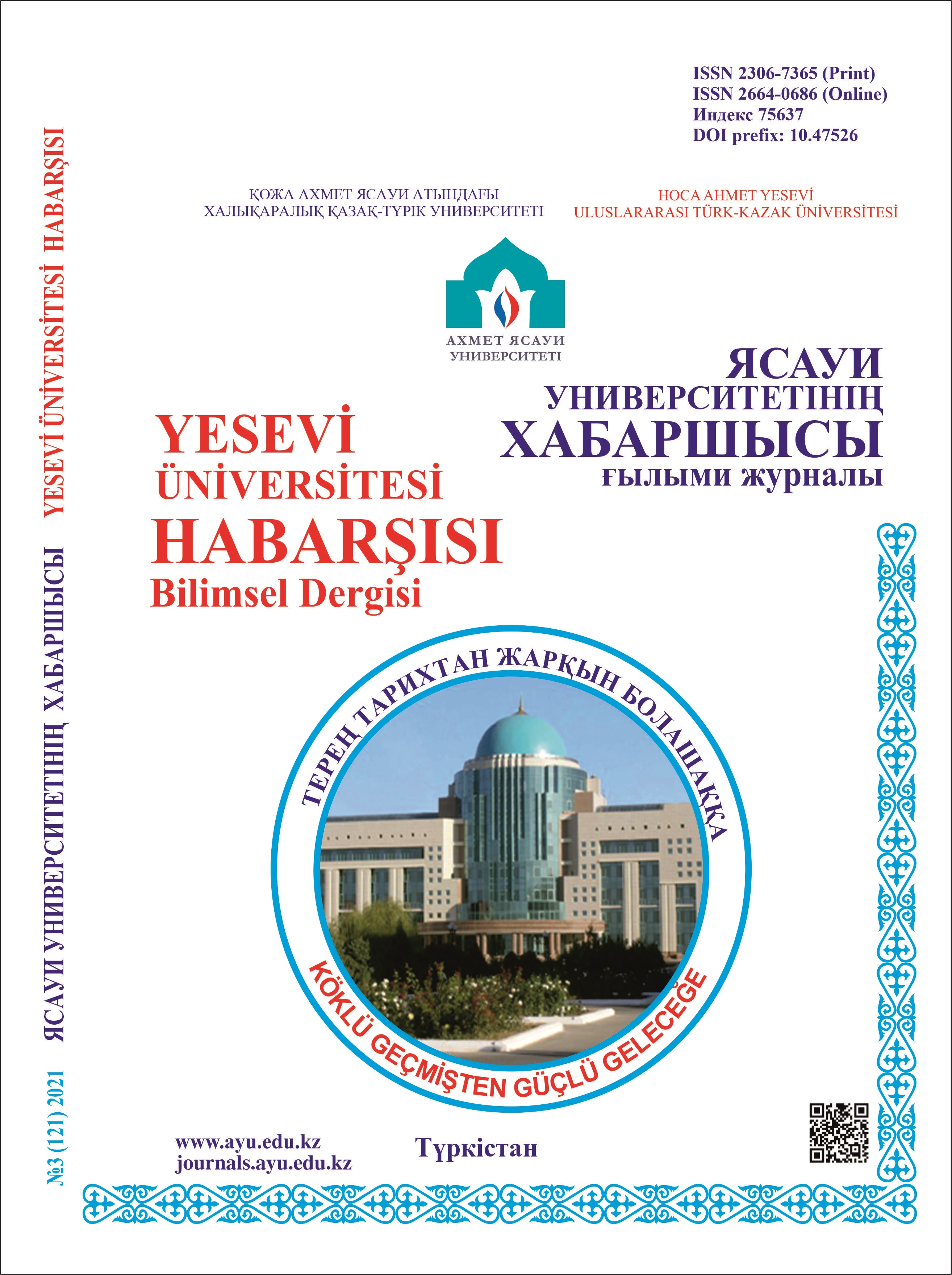Metacognitive Skills Enhancement in Biology Classes
262 171
Keywords:
metacognition, metacognitive skills, metacognitive prompts, metacognitive learning, biology.Abstract
The paper reports the study aimed at evaluating the impact of a 10-week metacognition-based biology curriculum on the students' metacognitive skills and biology understanding. The study involved 55 eighth-graders from two classes at Nazarbayev Intellectual School of Physics and Mathematics (Semey, Kazakhstan). One group used metacognitive prompts, while the other group studied the subject according to the standard curriculum. The results showed that the participants who received hints, also improving their metacognitive strategies when completing the task, scored higher on the biology test and reported an improvement in metacognitive skills compared to their peers studying according to the classical method. Qualitative analysis of the interviews revealed themes of collaboration and understanding among the students. They appreciated task specificity that deepened their understanding of biology and cooperative learning facilitated by metacognitive prompts that not only improved their understanding of the subject but also contributed to a positive classroom atmosphere. The students attached special importance to the use of metacognitive strategies, emphasizing that they would focus on completing the task. The present study emphasizes the effectiveness of metacognitive support in improving biology education. The authors recommend integrating metacognitive strategies into classroom learning routines, accentuating the beneficial effects they can have on students' experiences and learning outcomes.
References
СПИСОК ИСПОЛЬЗОВАННОЙ ЛИТЕРАТУРЫ / REFERENCES
Tavstuha O.G., Baikhozhaeva G.M., Ibadullayeva S.Zh. Studying biodiversity in the process of training future biology teachers // Ясауи университетінің хабаршысы [Iasaui universitetіnіn habarshysy]. – 2023. – №3(129). – Б. 253–267. https://doi.org/10.47526/2023-3/2664-0686.19
Torybayeva J., Tusseyev M., Zhorabekova A. The problem of organizing volunteer activities to provide a safe educational environment from the perspective of a healthy lifestyle of student youth // Ясауи университетінің хабаршысы [Iasaui universitetіnіn habarshysy]. – 2023. – № 3(129). – С. 211–223. https://doi.org/10.47526/2023-3/2664-0686.16
Абил А.С., Капина Э.А., Сугралиева А. Роль информационных технологий в цифровой трансформации высшего образования // Ясауи университетінің хабаршысы. – 2023. – №3(129). – С. 345–359. https://doi.org/10.47526/2023-3/2664-0686.26 [Abil A.S., Kapina E.A., Sugralieva A. Rol informacionnyh tehnologiy v cifrovoi transformacii vysshego obrazovania [The role of information technology in the digital transformation of higher education] // Iasaui universitetіnіn habarshysy. – 2023. – №3(129). – S. 345–359] [in Russian]
Сихынбаева Ж.С., Жолдасбекова Д.А. Болашақ арнайы педагогтардың кәсіби іс-әрекетін жетілдіруге дайындығын арттыру // Ясауи университетінің хабаршысы. – 2023. – № 3(129). – Б. 224–238. https://doi.org/10.47526/2023-3/2664-0686.17 [Sihynbaeva J.S., Joldasbekova D.A. Bolashaq arnaiy pedagogtardyn kasіbi іs-areketіn jetіldіruge daiyndygyn arttyru [Improving the readiness of future special teachers to improve their professional activities] // Iasaui universitetіnіn habarshysy. – 2023. – № 3(129). – B. 224–238.] [in Kazakh]
Жұмабаева Ж.А., Рысбаева А.Қ., Куралбаева А.А. Болашақ бастауыш білім педагогтарының оқу сапасын арттыру мәселелері // Ясауи университетінің хабаршысы. – 2023. – №3(129). – Б. 282–294. https://doi.org/10.47526/2023-3/2664-0686.21 [Jumabaeva J.A., Rysbaeva A.Q., Kuralbaeva A.A. Bolashaq bastauysh bіlіm pedagogtarynyn oqu sapasyn arttyru maselelerі [Problems of improving the quality of education of future primary education teachers] // Iasaui universitetіnіn habarshysy. – 2023. – №3(129). – B. 282–294.] [in Kazakh]
Perry J., Lundie D., Golder G. Metacognition in schools: what does the literature suggest about the effectiveness of teaching metacognition in schools? // Educational Review. – 2019. – Т. 71. – №4. – Р. 483–500. https://doi.org/10.1080/00131911.2018.1441127
Zumbach J. et al. Using prompts to scaffold metacognition in case-based problem solving within the domain of attribution theory // Journal of Problem-Based Learning. – 2020. – Т. 7. – №1. – Р. 21–31. https://doi.org/10.24313/jpbl.2020.00206
Chen C.H., Liu T.K., Huang K. Scaffolding vocational high school students’ computational thinking with cognitive and metacognitive prompts in learning about programmable logic controllers // Journal of Research on Technology in Education. – 2023. – Т. 55. – №3. – Р. 527–544. https://doi.org/10.1080/15391523.2021.1983894
Zeitlhofer I. et al. Effects of Cognitive and Metacognitive Prompts on Learning Performance in Digital Learning Environments // Knowledge. – 2023. – Т. 3. – №2. – Р. 277–292. https://doi.org/10.3390/knowledge3020019
Mevarech Z.R., Kramarski B. IMPROVE: A multidimensional method for teaching mathematics in heterogeneous classrooms // American educational research journal. – 1997. – Т. 34. – №2. – Р. 365–394. https://doi.org/10.3102/00028312034002365
Schraw G., Dennison R.S. Assessing metacognitive awareness // Contemporary educational psychology. – 1994. – Т. 19. – №4. – Р. 460–475. https://doi.org/10.1006/ceps.1994.1033
Sperling R.A. et al. Measures of children's knowledge and regulation of cognition //Contemporary educational psychology. – 2002. – Т. 27. – №1. – Р. 51–79. https://doi.org/10.1006/ceps.2001.1091
Chow C.W. et al. Construct Validity of the Two-Factor Revised Learning Process Questionnaire in a Singapore High School // Journal of Educational and Developmental Psychology. – 2018. – Т. 8. – №2. – Р. 159–169. https://doi.org/10.5539/jedp.v8n2p159
Santangelo J., Cadieux M., Zapata S. Developing student metacognitive skills using active learning with embedded metacognition instruction // Journal of STEM Education: Innovations and Research. – 2021. – Т. 22. – №2. – Р. 51–63.
Daumiller M., Dresel M. Supporting self-regulated learning with digital media using motivational regulation and metacognitive prompts // The Journal of Experimental Education. – 2019. – Т. 87. – № 1. – Р. 161–176. https://doi.org/10.1080/00220973.2018.1448744

